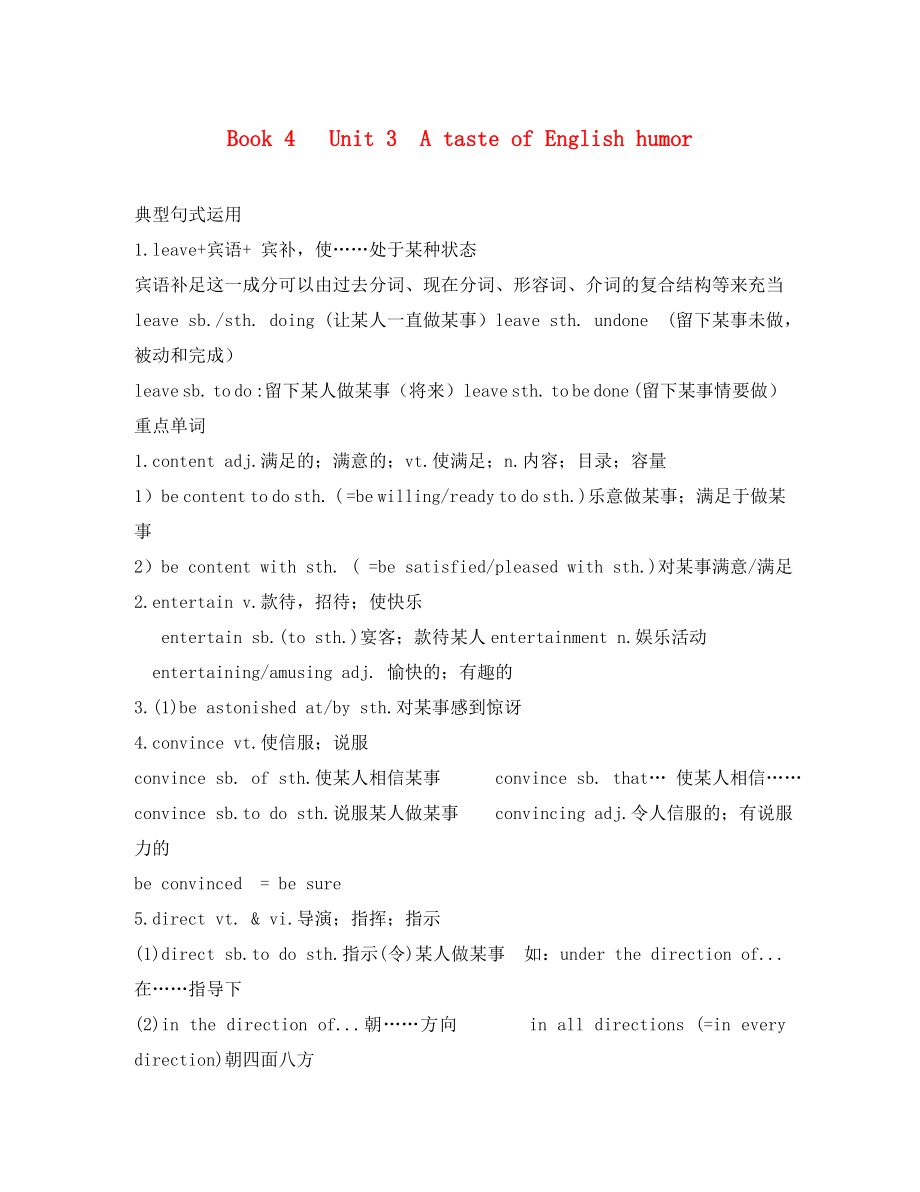《2020高中英語(yǔ) 短語(yǔ)知識(shí)點(diǎn) Unit 3 A taste of English humor學(xué)案 新人教版必修4》由會(huì)員分享�����,可在線閱讀��,更多相關(guān)《2020高中英語(yǔ) 短語(yǔ)知識(shí)點(diǎn) Unit 3 A taste of English humor學(xué)案 新人教版必修4(3頁(yè)珍藏版)》請(qǐng)?jiān)谘b配圖網(wǎng)上搜索��。
1����、Book 4 Unit 3 A taste of English humor
典型句式運(yùn)用
1.leave+賓語(yǔ)+ 賓補(bǔ),使……處于某種狀態(tài)
賓語(yǔ)補(bǔ)足這一成分可以由過去分詞�、現(xiàn)在分詞、形容詞���、介詞的復(fù)合結(jié)構(gòu)等來充當(dāng)
leave sb./sth. doing (讓某人一直做某事)leave sth. undone (留下某事未做��,被動(dòng)和完成)
leave sb. to do :留下某人做某事(將來)leave sth. to be done (留下某事情要做)
重點(diǎn)單詞
1.content adj.滿足的����;滿意的;vt.使?jié)M足���;n.內(nèi)容��;目錄�����;容量
1)be conten
2����、t to do sth. ( =be willing/ready to do sth.)樂意做某事���;滿足于做某事
2)be content with sth. ( =be satisfied/pleased with sth.)對(duì)某事滿意/滿足
2.entertain v.款待,招待��;使快樂
entertain sb.(to sth.)宴客���;款待某人entertainment n.娛樂活動(dòng)
entertaining/amusing adj. 愉快的�����;有趣的
3.(1)be astonished at/by sth.對(duì)某事感到驚訝
4.convince vt.使信服��;說服
conv
3�、ince sb. of sth.使某人相信某事 convince sb. that… 使某人相信……
convince sb.to do sth.說服某人做某事 convincing adj.令人信服的;有說服力的
be convinced = be sure
5.direct vt. & vi.導(dǎo)演��;指揮�����;指示
(1)direct sb.to do sth.指示(令)某人做某事 如:under the direction of...在……指導(dǎo)下
(2)in the direction of...朝……方向 in all directions (=in
4����、 every direction)朝四面八方
(3)directly adv.直接地,也可作連詞����,引導(dǎo)時(shí)間狀語(yǔ)從句,意為“一……就……”�����。
(4) director�; 董事, 經(jīng)理, 導(dǎo)演, 主管, 指揮者
如: The board nominated him as the new director. 董事會(huì)指定他為新董事
6.whisper 低聲說,耳語(yǔ)地����,=speak in a low voice
7. pick out 挑出,辨別出
pick up 1)撿起;接人��;收聽���,收看 2)買到廉價(jià)物��; 3)(實(shí)踐中)學(xué)會(huì)語(yǔ)言�����,技能
4)恢復(fù)�,好轉(zhuǎn)��;5)重新開始����;繼續(xù) pic
5、k up where we stopped
6)染病 pick up a cold 7)pick up speed (加速)
*pick and choose 挑三揀四 *pick sb.up.結(jié)識(shí)某人����,逮捕某人�����,責(zé)備某人,舉起某人
8.cut off: 切斷�����,中止��,與外界隔絕
cut down砍倒����;削減 cut up切碎
cut out 切掉;省略���;停止 cut across走捷徑��;走近路
cut in 插嘴 cut back 剪枝����;削減
cut open 切開 cut short
6��、切短��,剪短
cut through 鑿穿 cut away:切除
9.1)be badly off 境況不好�����,貧窮的;缺乏的(for)
如:The farmers in the remote areas are badly off . They are badly off for food
2)be well off 境況很好�����,富裕的��; 充裕的(for)
如:He's pretty well off for food and drink. 他的食物和酒儲(chǔ)存充裕���。
3)be badly needed 及其需要地 (極度地)
* go from ba
7�����、d to worse 每況愈下
*be worse off 情況更糟�,惡化 *be better off境況(尤指經(jīng)濟(jì)境況)較好
10. 1)我筋疲力 盡了I am worn out=I am tired out= I am exhausted
但不能用 I am given out 而是 I give out(give out 表筋疲力盡時(shí)為不及物動(dòng)詞,不能被動(dòng))
worn out���;還有“ 磨破的���,穿舊的”的意思
2)汽油用完了
The petrol has given out (不及物,不能被動(dòng))=The petrol has run out (不及物,不能被動(dòng))
但 run out of 為及物,用被動(dòng) The petrol has been run out of.
3)give out 還有“分發(fā)”之意
11. be particular about:對(duì)…很講究/挑剔
12. ordinary:平常的 common: 常見的 usual: 經(jīng)常的(行為習(xí)慣) normal:正常的
13.on special occasions: 在特殊的場(chǎng)合
*14.underdog:失敗者�,出于劣勢(shì)者 *15.subtle;微妙的�,精巧的
*16.charming: 迷人的�,有魅力的 *17.tramp :流浪漢
 2020高中英語(yǔ) 短語(yǔ)知識(shí)點(diǎn) Unit 3 A taste of English humor學(xué)案 新人教版必修4
2020高中英語(yǔ) 短語(yǔ)知識(shí)點(diǎn) Unit 3 A taste of English humor學(xué)案 新人教版必修4

